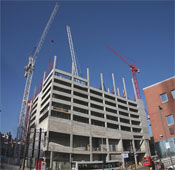How to Write a Resume for a Civil Engineering Position
|
|
 | |
| Civil engineer jobs require college degrees and specialized licenses that prove you have the mathematical schooling and awareness of ordinances such as building codes that will ensure sound construction. |
The best way to approach resume writing is by attempting to think from the point of view of a potential employer who is looking for the best person to fill his or her open position. In other words, your resume in a highly professional and involved field like civil engineering should focus on showing your unique qualification for the position being sought. Here are a few things to keep in mind in your search for the perfect resume.
First, when crafting an effective and pointed resume for the field of civil engineering, you need to know precisely what you bring to the table as a general employee. You can never know what you are capable of cooking if you don't know what ingredients are available in your proverbial kitchen, and crafting a resume off the top of your head is like planning a meal without knowing what ingredients are available. In other words, a great first step to a powerful resume is making a general resume that includes every bit of work experience you have ever had, within and without your particular field. As you write down all the different work experience, training, and education you have accumulated over the years, you will be better capable of extracting from this wealth of information a driven and pointed resume for the position you are seeking within the civil engineering field.
Once you have a list of your work experience and education in front of you, it is time to distill the most appropriate and valid aspects of it to write preferably a one page resume for a civil engineering position. The reason you should attempt to concentrate your resume to one page is so that only your most relevant information will be included and a potential employer will be tempted to give you an interview to get more information. Also, if you are coming into a position from a related but different field, you will mostly be up against other entry level applicants. Your resume shouldn't be appreciably longer than the norm unless you have a lot of specifically applicable work experience for the precise position, or if you have been in the field in excess of ten years.
When writing your resume, you should focus on keeping it concise, relevant, and pointed. This means you should have a very good idea of the specific needs of the position being applied for so you can effectively paint a picture of why you are an excellent choice for that position. In other words, you should keep in mind that an employer is simply looking for the employee who he or she feels is best suited for the position at hand. Even if you do not have years of work experience, you can still present yourself as a valuable asset to a potential employer by focusing on your skill set, education, and formal training and by applying this to the position being sought. If you are successful at showing your specific qualifications for the position being sought, a potential employer will be interested in you more than other applicants simply because you look like an excellent choice for the position due to your specificity. Specificity is a function of how and why you are particularly well suited for a position, regardless of your specific experience in the position.
When looking over your completed list of accolades, training, education, and work experience; it is a fine idea to imagine the particular needs of the position and make a statement as to why you will fill these needs beautifully due to your list of accolades and credentials. This statement should serve to catch the eye of a potential employer and allow him to see that you are significantly well suited for the position, and also it will subconsciously tell him that you have a well developed knowledge of the field at the same time.
If you can effectively paint a picture of what skills and assets you bring to the table, and why these assets are essential for the position you are seeking, more often than not you will get an interview if not the job. Always remember that in a field like civil engineering, sometimes the greatest asset to a contractor or firm is specific abilities from a completely different discipline like mathematics or architecture. Throughout history many of the greatest civil engineers were not formally civil engineers but simply skilled individuals from other disciplines. Always keep this in mind and do not limit yourself because of a label. If you are capable of showing how applicable your skill set is to the position for which you are applying you will be well on your way to scoring the job you are seeking.
In conclusion, keep an open mind and stay focused on the needs of the position. Remember that a potential employer in the civil engineering field needs employees who can deliver a given skill or fulfill a particular position. They do not necessarily need a civil engineer or any engineer with years of experience, for that matter. The more effectively you focus on the needs of the position and how you can accomplish them, the more effective your resume will be.




